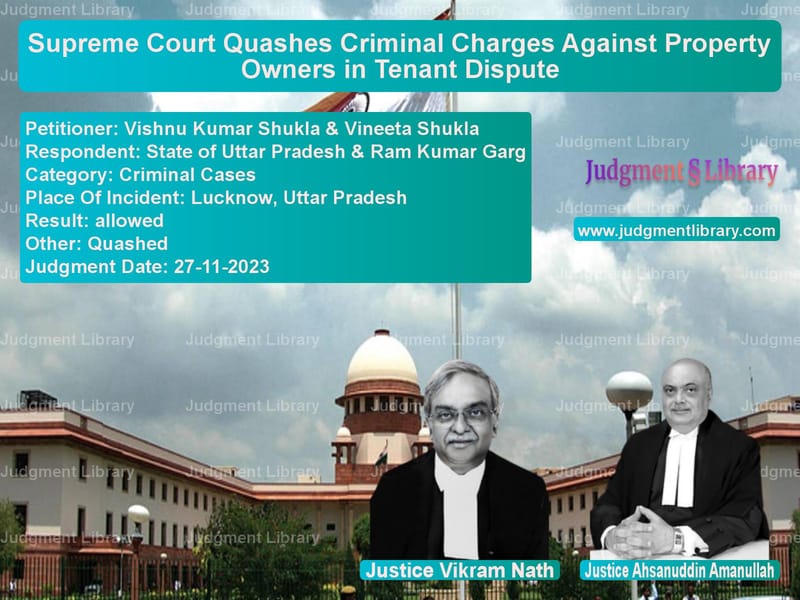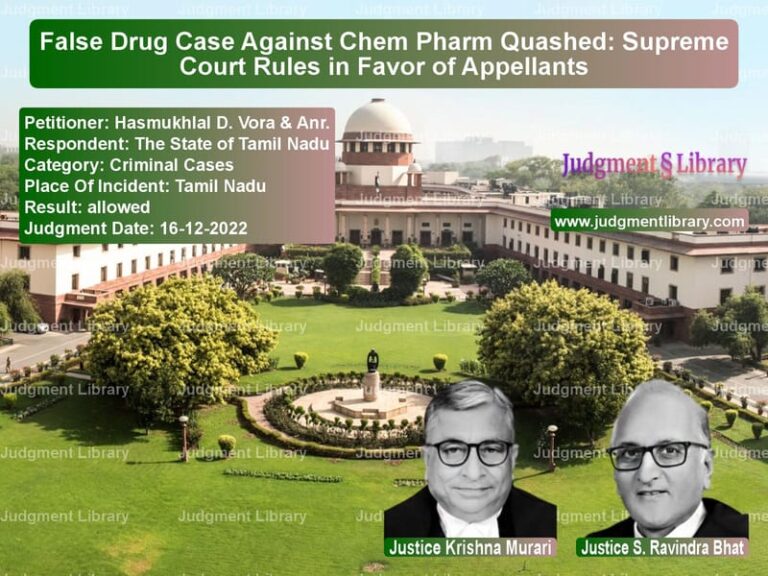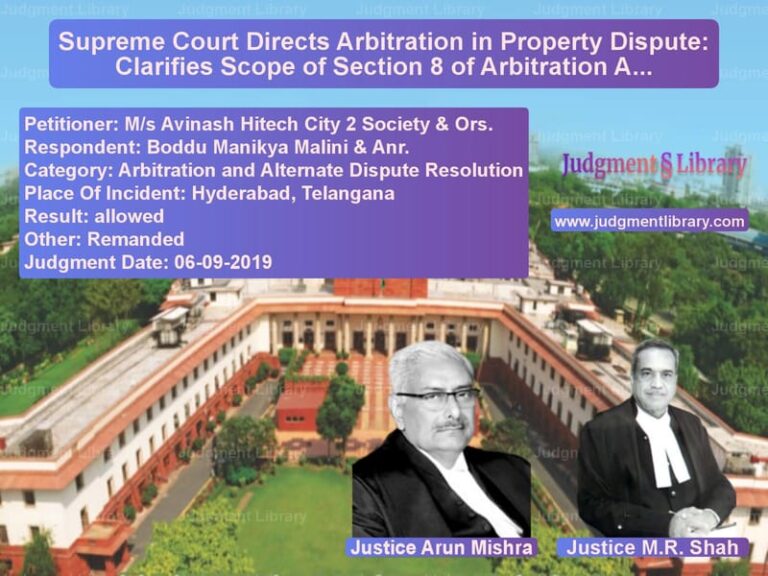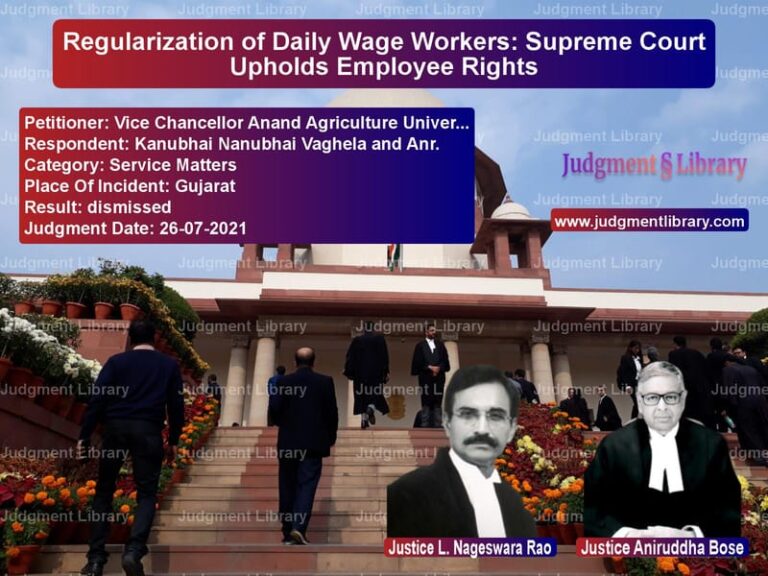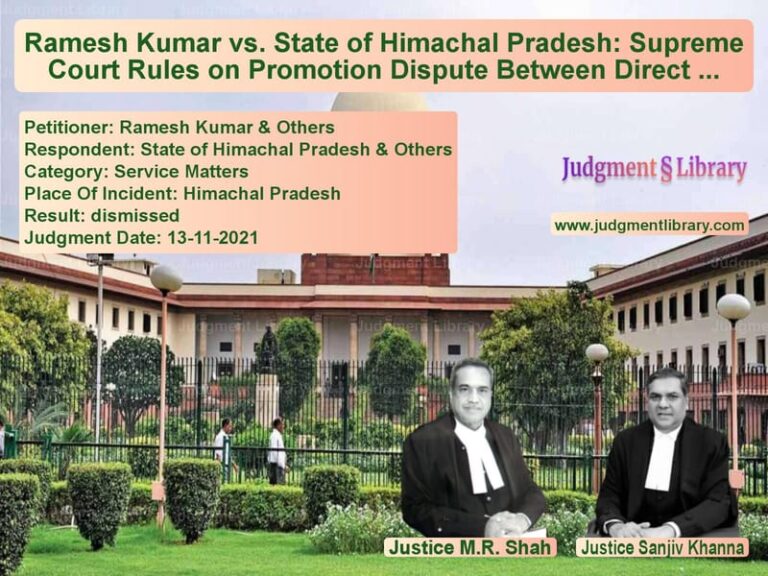Supreme Court Quashes Criminal Charges Against Property Owners in Tenant Dispute
The Supreme Court of India recently ruled in Vishnu Kumar Shukla & Anr. v. State of Uttar Pradesh & Anr., quashing criminal charges against property owners who were accused of unlawful trespass and theft by a tenant. The judgment, delivered by Justices Vikram Nath and Ahsanuddin Amanullah, highlights the misuse of criminal law in property disputes and the need for judicial scrutiny in cases of false allegations.
Background of the Case
The case arose from a dispute over a shop in Lucknow, Uttar Pradesh. The complainant, Ram Kumar Garg (R2), claimed to be a tenant of a shop in a property owned by Hari Narayan Shukla. On June 29, 2011, the appellants, Vishnu Kumar Shukla and Vineeta Shukla, allegedly locked the shop, broke a wall, and looted goods, documents, and a two-wheeler.
R2 filed an FIR (Case No. 341/2011) at Hazratganj Police Station on July 1, 2011, accusing the appellants of offenses under:
- Section 448 IPC (house trespass)
- Section 454 IPC (lurking house trespass)
- Section 380 IPC (theft in a dwelling house)
The police, however, filed a charge sheet only under Section 448 IPC, dismissing the other charges. The trial court rejected the appellants’ discharge plea on June 2, 2017, and the Allahabad High Court upheld this decision on August 2, 2017. The appellants then approached the Supreme Court.
Arguments by the Appellants
The appellants contended that:
- The FIR was a misuse of criminal law to harass them and prevent them from enjoying their property.
- Vineeta Shukla was the legal owner of the shop, having purchased it through a registered sale deed.
- The complainant’s tenancy claim was based on a forged memorandum dated November 24, 2005, which falsely included the Indian Rupee symbol (₹), introduced only in 2010.
- The police charge sheet did not support the allegations of theft and trespass.
- The civil court had found prima facie evidence of document forgery by the complainant.
Arguments by the Respondents
The State of Uttar Pradesh opposed the discharge plea, arguing that:
- The complainant had presented a tenancy agreement as proof of possession.
- The trial court had correctly refused to discharge the appellants.
- Minor discrepancies in evidence should be examined during trial.
Supreme Court’s Analysis
1. Fraudulent Tenancy Document
The Court found that the complainant relied on a tenancy agreement from 2005, but the document used the ₹ symbol, which was only introduced in 2010. This discrepancy indicated forgery.
2. Absence of Strong Evidence
The Court ruled:
“The entire case rests on a document found to be forged. There is no credible claim by the complainant proving lawful tenancy.”
Since the police charge sheet itself dropped key charges, the Court concluded that the complaint was weak.
3. Abuse of Criminal Process
The Court emphasized that civil disputes should not be converted into criminal cases to pressurize property owners:
“The criminal case filed by the complainant is a clear abuse of the process of the court.”
It noted that property disputes should be handled through civil litigation.
4. Lack of Complainant’s Presence
The Court observed that despite being served notice, the complainant did not appear in the Supreme Court, further weakening his case.
Final Judgment
The Supreme Court:
- Quashed the criminal case against the appellants.
- Set aside the High Court and trial court orders.
- Directed the immediate discharge of the appellants.
- Clarified that pending civil proceedings, if any, remain unaffected.
Conclusion
This ruling reinforces:
- That criminal law should not be misused to settle property disputes.
- The importance of scrutinizing documentary evidence in tenancy claims.
- The need for courts to prevent harassment through baseless criminal cases.
- The judiciary’s commitment to protecting individuals from malicious litigation.
The Supreme Court’s decision sets a precedent for similar cases, ensuring that property disputes remain within the domain of civil law rather than being used as tools for criminal intimidation.
Petitioner Name: Vishnu Kumar Shukla & Vineeta Shukla.Respondent Name: State of Uttar Pradesh & Ram Kumar Garg.Judgment By: Justice Vikram Nath, Justice Ahsanuddin Amanullah.Place Of Incident: Lucknow, Uttar Pradesh.Judgment Date: 27-11-2023.
Don’t miss out on the full details! Download the complete judgment in PDF format below and gain valuable insights instantly!
Download Judgment: vishnu-kumar-shukla-vs-state-of-uttar-prade-supreme-court-of-india-judgment-dated-27-11-2023.pdf
Directly Download Judgment: Directly download this Judgment
See all petitions in Fraud and Forgery
See all petitions in Bail and Anticipatory Bail
See all petitions in Landlord-Tenant Disputes
See all petitions in Property Disputes
See all petitions in Attempt to Murder Cases
See all petitions in Judgment by Vikram Nath
See all petitions in Judgment by Ahsanuddin Amanullah
See all petitions in allowed
See all petitions in Quashed
See all petitions in supreme court of India judgments November 2023
See all petitions in 2023 judgments
See all posts in Criminal Cases Category
See all allowed petitions in Criminal Cases Category
See all Dismissed petitions in Criminal Cases Category
See all partially allowed petitions in Criminal Cases Category

